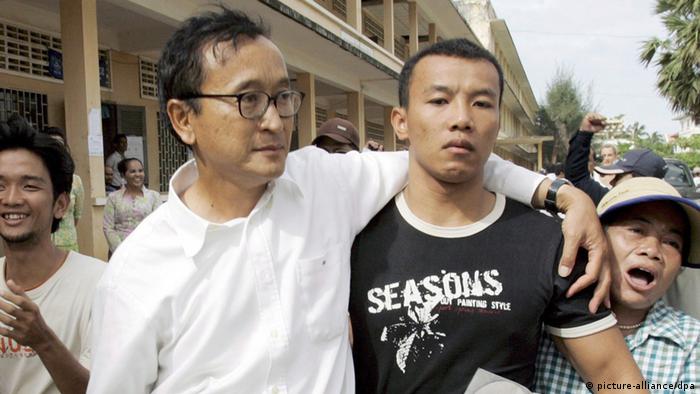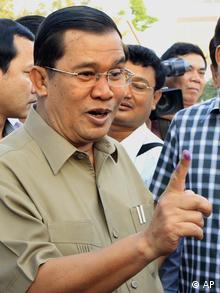
Politics
Deutsche Welle News
Cambodia's two main opposition parties have recently merged to form an alliance ahead of the 2013 parliamentary elections. Experts say
the merger could spell trouble for the ruling CPP, which seeks to extend
its rule.
On July 17, Cambodia's Sam Rainsy Party (SRP) and the Human Rights
Party (HRP) leaders met in the Philippines to finalize the merger.
Kem Sokha, president of the HRP told the media afterwards that the two parties had decided to forge an alliance because it was desired by the Cambodian people.
Cambodian experts say the merger of the two main opposition parties has worried Prime Minister Hun Sen's left-leaning Cambodian People's Party (CPP), which has been in power since 1979.
The CPP was earlier known as the Kampuchean People's Revolutionary Party (KPRP), and was renamed in 1991. The HRP and the SRP are liberal parties.
Parliamentary elections
Ou Virak, a Cambodian human rights activist, told DW that the opposition parties stood a good chance of winning next elections after the merger. However, he said, the SRP and the HRP needed to strengthen themselves.
 PM Hun Sen says the opposition merger is of little consequence
"The new alliance should now devise strategies to strengthen its
structure, the organization, and the internal decision-making
processes," said Ou.
PM Hun Sen says the opposition merger is of little consequence
"The new alliance should now devise strategies to strengthen its
structure, the organization, and the internal decision-making
processes," said Ou.
In June, the Cambodians voted in the local government elections, also known as commune elections, with the majority of voters supporting the CPP. However, around 60 percent of the eligible voters abstained from elections.
"The result of the local government elections tells us that most Cambodian people are not happy with the ruling regime. So, there is a chance that the new alliance can mobilize the people," said Ou. The local government elections, he added, are less important for the Cambodian people than the 2013 parliamentary elections.
Pen Bona, a Phnom Penh-based journalist, told DW that the Cambodian opposition parties were too weak to pose any challenge to the ruling CPP.
"The CPP has staunch supporters, ranging from government officials to ordinary people who have benefited from the incumbent government. Their living conditions have improved. So, I think, they still support the CPP," Pen said.
"In the past, the opposition parties tried to merge but failed. So people are hoping that this time the alliance will survive," he added.
"Storm in a teacup"
Prime Minister Hun Sen told the state media that he was not intimidated by the opposition merger.
"It is a storm in a teacup; it has no impact at all," he said.
But Ou thinks otherwise. The opposition alliance, he said, has made the ruling party uneasy.
"I think the ruling party is concerned (about the merger), and I think it will try to make sure that it wins the next election. But we hope that the 2013 elections are going to be free and fair, and the ruling party will not try to manipulate them," Ou said.
He said that the fact that the ruling party controls the state media and the Cambodian election commission makes it more difficult for the opposition parties to succeed in parliamentary elections.
Author: Chheng Niem
Editor: Shamil Shams/ Michael Knigge
Kem Sokha, president of the HRP told the media afterwards that the two parties had decided to forge an alliance because it was desired by the Cambodian people.
Cambodian experts say the merger of the two main opposition parties has worried Prime Minister Hun Sen's left-leaning Cambodian People's Party (CPP), which has been in power since 1979.
The CPP was earlier known as the Kampuchean People's Revolutionary Party (KPRP), and was renamed in 1991. The HRP and the SRP are liberal parties.
Parliamentary elections
Ou Virak, a Cambodian human rights activist, told DW that the opposition parties stood a good chance of winning next elections after the merger. However, he said, the SRP and the HRP needed to strengthen themselves.
 PM Hun Sen says the opposition merger is of little consequence
PM Hun Sen says the opposition merger is of little consequence In June, the Cambodians voted in the local government elections, also known as commune elections, with the majority of voters supporting the CPP. However, around 60 percent of the eligible voters abstained from elections.
"The result of the local government elections tells us that most Cambodian people are not happy with the ruling regime. So, there is a chance that the new alliance can mobilize the people," said Ou. The local government elections, he added, are less important for the Cambodian people than the 2013 parliamentary elections.
Pen Bona, a Phnom Penh-based journalist, told DW that the Cambodian opposition parties were too weak to pose any challenge to the ruling CPP.
"The CPP has staunch supporters, ranging from government officials to ordinary people who have benefited from the incumbent government. Their living conditions have improved. So, I think, they still support the CPP," Pen said.
"In the past, the opposition parties tried to merge but failed. So people are hoping that this time the alliance will survive," he added.
"Storm in a teacup"
Prime Minister Hun Sen told the state media that he was not intimidated by the opposition merger.
"It is a storm in a teacup; it has no impact at all," he said.
But Ou thinks otherwise. The opposition alliance, he said, has made the ruling party uneasy.
"I think the ruling party is concerned (about the merger), and I think it will try to make sure that it wins the next election. But we hope that the 2013 elections are going to be free and fair, and the ruling party will not try to manipulate them," Ou said.
He said that the fact that the ruling party controls the state media and the Cambodian election commission makes it more difficult for the opposition parties to succeed in parliamentary elections.
Author: Chheng Niem
Editor: Shamil Shams/ Michael Knigge

1 comment:
Boy lover...
Post a Comment